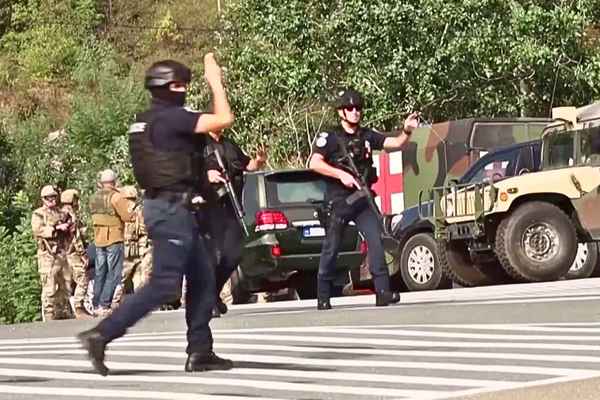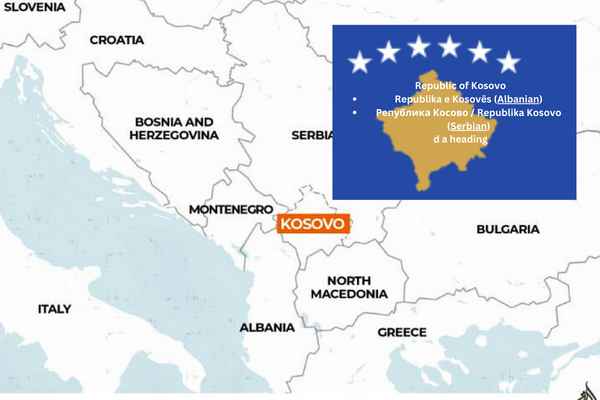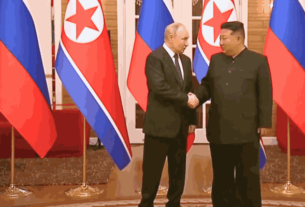Kosovo, a beautiful area in the Balkans, has been a hotspot for tension and fighting for a long time. Recent events have put this disputed place back in the world’s attention.
Kosovo at a Crossroads
Kosovo’s recent rise in tensions has worried countries around the world. The US especially wants Serbia to move its big military presence away from Kosovo’s border. Things heated up after about 30 armed people fought with Kosovo police in the northern part, where a lot of Serbians live.
For over a month, tensions had been increasing in this Balkan area with the main antagonists being the Albanian people and the minority ethnical Serbs. At Banjska Village, a siege occurred at a Serbian Orthodox monastery, which had a devastating consequence as a Kosovan police officer along with three ethnic gunmen succumbed to the ordeal.
The International Response: Urgent Calls for De-Escalation
The world is moving fast to calm things down. The UK sent soldiers to help the NATO peacekeeping team in Kosovo (Kfor). NATO saw how serious this is and said more soldiers can come to help. They haven’t said how many or which countries are sending them yet.
The White House said Serbia is gathering a lot of military power near Kosovo’s border, with big weapons like artillery, tanks, and mechanized infantry. This move is really worrying leaders worldwide because it could make things very unstable. President Biden’s team is talking to friends in other countries to make sure the NATO peacekeeping team in Kosovo is ready for this kind of threat.
Roots of the Conflict: Kosovo and it’s Troubled History
To understand the complexities of this Balkan Regions’ situation, it’s crucial to delve into the region’s turbulent history. The conflict traces back to the breakup of Yugoslavia in the 1990s when Kosovo, a province of the former Yugoslavia, sought independence. The quest for independence faced brutal Serbian repression, leading to a NATO bombing campaign from March to June 1999. Serbian forces eventually withdrew from Kosovo, but for many, the underlying issues remained unresolved.
In 2008, Kosovo declared independence, a move that remains unrecognized by Serbia, as well as key allies like China and Russia. This lingering dispute over Kosovo‘s status continues to fuel tensions in the region.
Ethnic Complexities: Albanians and Serbs in Kosovo
This Balkan Regions’ demographics add another layer of complexity to the situation. While many Serbs consider this balkan Region, the birthplace of their nation, the majority of Kosovo‘s population is ethnic Albanian. This ethnic divide has created persistent challenges in fostering coexistence and addressing the aspirations of both communities.
The Battle of Banjska: A Turning Point
The recent escalation in Kosovo was punctuated by the tragic events at Banjska village, where an armed group led by Milan Radoicic, the deputy leader of Serb List, engaged in a deadly firefight with Kosovan police. The clash resulted in casualties on both sides and raised concerns about the source of modern weapons used by the Serb paramilitaries.
Kosovo‘s government produced evidence suggesting that a grenade launcher used by the armed group had been supplied by the Serbian army. These events further stoked fears that the incident could be used as a pretext for Serbian military intervention in northern Kosovo.
The Road Ahead: A Complex and Uncertain Path
As tensions continue to simmer, the international community grapples with the urgent need for de-escalation and a return to dialogue. The fate of Kosovo, its people, and the stability of the Balkans hang in the balance. The response from NATO, the deployment of British troops, and the calls for Serbia to withdraw its forces underscore the gravity of the situation.

But the problems in this Balkan area go way back—they’re about history, who people are, and arguments over land. Finding a real fix for all this is going to be tough, but it’s super important for Kosovo to stay peaceful and for everyone who lives there to be okay.
In conclusion, the situation in Kosovo serves as a stark reminder of the complex geopolitical realities in the Balkans. As the international community strives to prevent further escalation and promote peaceful dialogue, it is vital to consider the historical context and ethnic complexities that continue to shape Kosovo‘s destiny. The hope is that diplomacy, cooperation, and a commitment to peace will ultimately prevail, allowing Kosovo and its people to move towards a more stable and prosperous future.
Also Read
Lucy Letby – Unbelievable Real Evil Horror Story and the Unforgettable Trauma for Years




